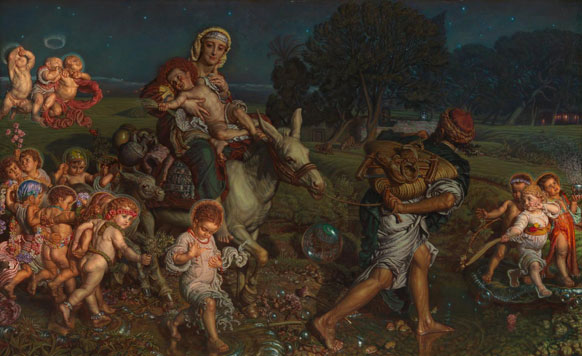Feast Day: December 28th

Parents with newborns know the sacrifice of waking up in the middle of the night to care for their children, but St. Joseph, shortly after the birth of his Son, had a very different abrupt awakening.
an angel of the Lord appeared to Joseph in a dream and said, “Rise, take the child and his mother, and flee to Egypt, and remain there till I tell you; for Herod is about to search for the child, to destroy him.”
[Matthew 2:13]
He obeys the word from God, but before we learn of their sojourn in Egypt, or their return to Nazareth, Matthew tells us of the terrible onslaught that came upon Bethlehem with Herod’s anger and jealousy.
Herod, when he saw that he had been tricked by the Wise Men, was in a furious rage, and he sent and killed all the male children in Bethlehem and in all that region who were two years old or under, according to the time which he had ascertained from the Wise Men.
[Matthew 2:16]
Some scholars claim that this event is apocryphal (not historical) because it is not mentioned by historical records of the time, but if we realize both that Herod became horrifically violent and uncontrolled especially in his final years of his reign, and that there were probably only 10 or 15 little boys in Bethlehem given the size of that village at the time of Christ, it seems that an event of this sort would not be remembered by the larger world.
The question for us then is why do we celebrate this feast just three days after Christmas? Obviously, these martyrs are connected in time with the infant Jesus. They perished within two years of his own birth, and because Herod could not stand the idea of his power being usurped (by a baby?!) Yet most saints are exemplars for us of some virtue, disposition, set of accomplishments they did following God’s will, yet these little boys did not know Christ, nor that their deaths were suffered in lieu of Him. Their families probably did not know the rationale behind Herod’s brutality, nor did Herod really hate Christ personally, he just did not want somebody else claiming royal authority (because his was so tenuous).
Matthew assists our reflection by quoting Jeremiah 31:15:
Then was fulfilled what was spoken by the prophet Jeremiah: “A voice was heard in Ramah, wailing and loud lamentation, Rachel weeping for her children; she refused to be consoled, because they were no more.””
[Matthew 2:17-18]
If we knew the Old Testament inside and out we would know that Jeremiah continues:
“Keep your voice from weeping, and your eyes from tears; for your work shall be rewarded, says the LORD, and they shall come back from the land of the enemy. There is hope for your future, says the LORD, and your children shall come back to their own country.”
[Jeramiah 31:16-17]
This scriptural insight offers us a way to see this day aright. Rachel, the wife of Jacob all the way back in Genesis 29, of course was the mother of Joseph and Benjamin, but Jeremiah transposed her weeping forward to the Israelites killed during the wars and exiles of his day, and Matthew, knowing her to have been buried in Bethlehem, can see the final fulfilment of that prophecy in the children murdered in Christ’s place.
Those Holy Innocents stand now for us as an icon of every child of God killed for jealousy, anger, misunderstanding, or hatred, or lost tragically in any other way but they also force the Christian to recall that – Christ having taken on the ramifications of sin, all the way to death – all those deaths can still be victories in the end. The eternal life that Our Lord wants to give us is far more precious than the physical life we cherish, and though the worst of worldly evils is the callous loss of human life, it can also be the moment that Christ’s redemption is accomplished, and His promise kept: “your children shall come back to their own country.”
– Fr. Dominic Rankin has only done a handful of funerals as a priest, but knows that they are both one of the hardest things a priest gets to do, and also the most grace-filled. Miraculously, amid grief and loss, Christ’s victory is continued. The shadow of the cross does fall over the crèche, but so does the light of Easter.
